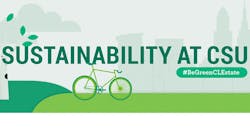Recycling, waste reduction boost sustainability at Cleveland State University
Cleveland State University in Cleveland, Ohio, has decreased the amount of waste sent to landfill by more than 20 tons and increased the quantity of materials captured for recycling and composting by nearly 20 tons.
The university's Office of Sustainability says that in 2018, trash volumes decreased by 22.26 tons, and materials diverted by either recycling or composting increased by 19.80 tons.
Several initiatives contributed to the reduction in landfill waste. Twenty recycling bins were placed in the concourse area of the Wolstein Center, the university's sports arena. New outdoor recycling stations were distributed to 11 high-traffic areas across campus. In addition, new labels on bins across campus clearly indicate which materials can be placed in recycling bins.
The Fenn Tower residence hall has seen a significant decrease in waste generated after recycling bins were placed on every floor. The response from students was so positive that regular trash pickups in Fenn Tower were cut in half.
Cleveland State’s composting program also played a significant role in reducing waste. Food waste is composted in the Student Center, Wolstein Center and Elements Bistro. All disposable tableware used in catering has been replaced with 100 percent plant-based compostable dining ware. All landscaping waste is composted off-site. In 2018 alone, 67 tons of food and landscaping waste was composted.
Students, faculty and staff currently have access to recycling bins for mixed paper, plastic and cans, cardboard and batteries. Recycling bins for plastic and cans have green lids.
Other waste streams collected on campus include shrink wrap, steel, tires, yard waste, computers and electronics, ink cartridges, lead-acid batteries, motor oil, fluorescent bulbs and office furniture.
About the Author
Mike Kennedy
Senior Editor
Mike Kennedy, senior editor, has written for AS&U on a wide range of educational issues since 1999.
